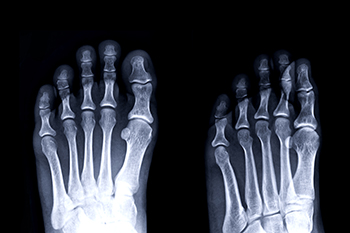6650 Frankford Ave
Philadelphia, PA 19135

The foot bones are responsible for the mobility of the body, in addition to providing mechanical support for the soft tissues. This is necessary to support the body’s weight while standing and moving. Three categories of bones are in each foot. The tarsals consist of seven bones that are located in the ankle area. The bones in the toes are known as phalanges and connect to the metatarsals, the third group of bones. Additionally, the foot is divided into three areas referred to as the hindfoot, midfoot, and forefoot. Each part of the foot has different functions which work in unison to help you walk and run. The bones in the foot may break when enduring a stress fracture or from a sudden injury. If you would like additional information about the bones in the feet, it is suggested that you confer with a podiatrist who can provide you with the knowledge you are seeking.
If you have any concerns about your feet, contact John M. Fanelly, DPM from Northeast Philadelphia. Our doctor can provide the care you need to keep you pain-free and on your feet.
Biomechanics in Podiatry
Podiatric biomechanics is a particular sector of specialty podiatry with licensed practitioners who are trained to diagnose and treat conditions affecting the foot, ankle and lower leg. Biomechanics deals with the forces that act against the body, causing an interference with the biological structures. It focuses on the movement of the ankle, the foot and the forces that interact with them.
A History of Biomechanics
Modern technological improvements are based on past theories and therapeutic processes that provide a better understanding of podiatric concepts for biomechanics. Computers can provide accurate information about the forces and patterns of the feet and lower legs.
Understanding biomechanics of the feet can help improve and eliminate pain, stopping further stress to the foot.
If you have any questions please feel free to contact our office located in Philadelphia, PA . We offer the newest diagnostic and treatment technologies for all your foot and ankle needs.